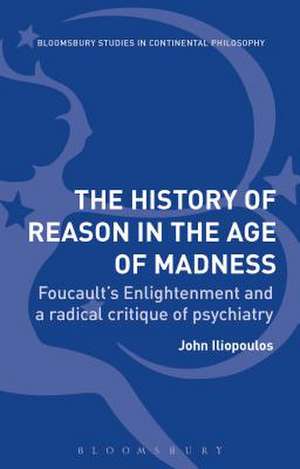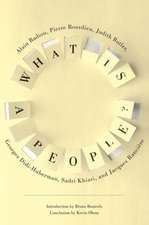The History of Reason in the Age of Madness: Foucault’s Enlightenment and a Radical Critique of Psychiatry
Autor John Iliopoulosen Limba Engleză Paperback – 6 feb 2019
| Toate formatele și edițiile | Preț | Express |
|---|---|---|
| Paperback (1) | 230.24 lei 6-8 săpt. | |
| Bloomsbury Publishing – 6 feb 2019 | 230.24 lei 6-8 săpt. | |
| Hardback (1) | 772.98 lei 6-8 săpt. | |
| Bloomsbury Publishing – 26 iul 2017 | 772.98 lei 6-8 săpt. |
Preț: 230.24 lei
Preț vechi: 296.79 lei
-22% Nou
Puncte Express: 345
Preț estimativ în valută:
44.06€ • 47.11$ • 36.73£
44.06€ • 47.11$ • 36.73£
Carte tipărită la comandă
Livrare economică 17 aprilie-01 mai
Preluare comenzi: 021 569.72.76
Specificații
ISBN-13: 9781350099241
ISBN-10: 1350099244
Pagini: 224
Dimensiuni: 156 x 234 mm
Greutate: 0.32 kg
Editura: Bloomsbury Publishing
Colecția Bloomsbury Academic
Locul publicării:London, United Kingdom
ISBN-10: 1350099244
Pagini: 224
Dimensiuni: 156 x 234 mm
Greutate: 0.32 kg
Editura: Bloomsbury Publishing
Colecția Bloomsbury Academic
Locul publicării:London, United Kingdom
Caracteristici
A reassessment of Foucault's fundamental theses and their application to the concrete field of psychiatry which will make his ideas accessible to psychiatrists and will give a fresh perspective to Foucault scholars
Notă biografică
John Iliopoulos is a Consultant Psychiatrist and Researcher at the Centre for Philosophy and Psychiatry, University of Athens, Greece.
Cuprins
Introduction 1. What is Enlightenment? 2. The Historical Critique of Phenomenology 3. Foucault's Epistemology: Sujectivity, Truth, Reason, and the History of Madness 4. Is Foucault and Anti-Psychiatrist? 5. Hysteria at the Limits of Medical Rationality 6. Foucault and Psychoanalysis: Traversing the Enlightenment Conclusion Bibliography Index
Recenzii
Grounded in a deep knowledge of Foucault's oeuvre, The History of Reason in the Age of Madness establishes remarkable continuity from his early, under discussed, Introduction to Kant's Anthropology to his final articles on the Enlightenment. In addition to seriously advancing our comprehension of major works such as the History of Madness John Iliopoulos' clear and lucid prose sheds new light on reason, rationalism and madness as well as on anthropology and psychiatry. A highly valuable undertaking.
'The History of Reason in the Age of Madness offers a remarkably fresh and convincing interpretation of Foucault's complex and often misunderstood relation with Enlightenment philosophy and psychiatry. It successfully challenges the still prevalent view that Foucault's thinking resolutely opposes these movements, cogently arguing that such a reductive view would contradict one of the basic aims of Foucault's writings which is to expose the ambiguity of all phenomena, their susceptibility to ongoing critique, modification and radical transformation. This important work is a must for scholars of Foucault, critical psychiatry and Enlightenment studies.'
'The History of Reason in the Age of Madness offers a remarkably fresh and convincing interpretation of Foucault's complex and often misunderstood relation with Enlightenment philosophy and psychiatry. It successfully challenges the still prevalent view that Foucault's thinking resolutely opposes these movements, cogently arguing that such a reductive view would contradict one of the basic aims of Foucault's writings which is to expose the ambiguity of all phenomena, their susceptibility to ongoing critique, modification and radical transformation. This important work is a must for scholars of Foucault, critical psychiatry and Enlightenment studies.'













